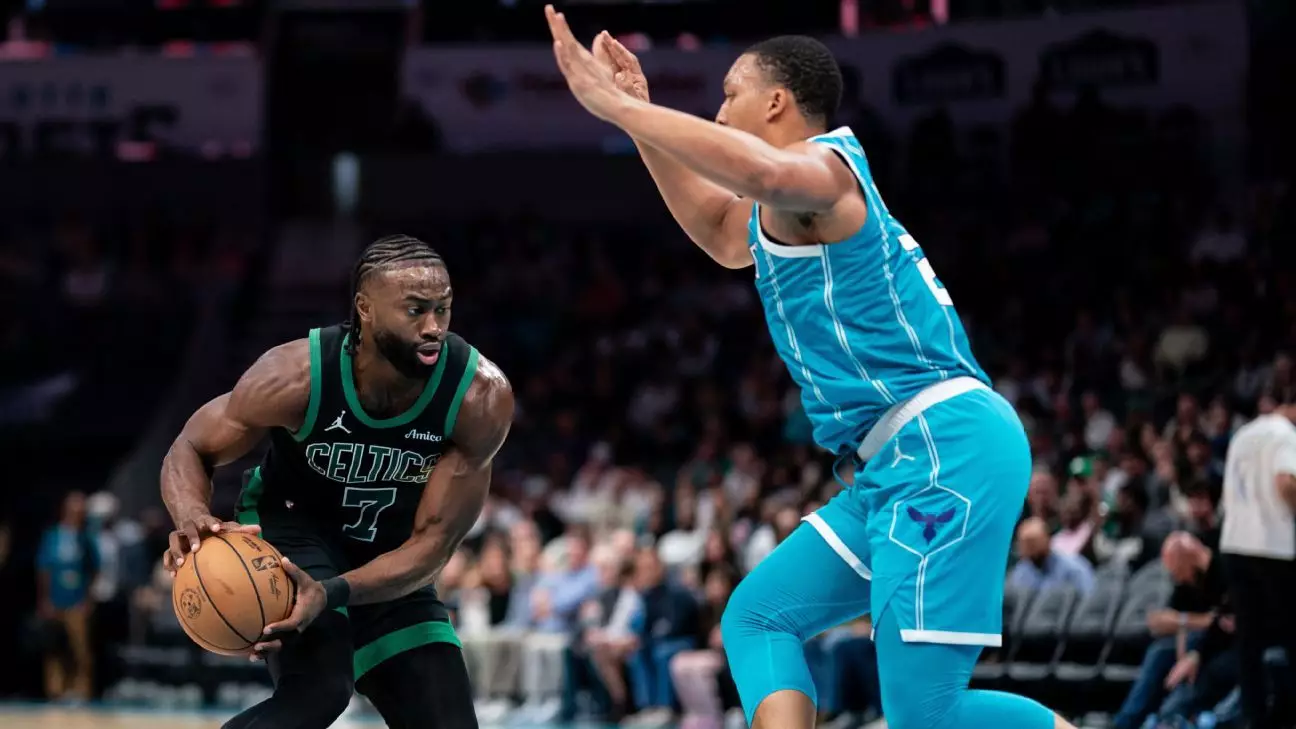On a notable Friday night, the Boston Celtics faced off against the Charlotte Hornets, culminating in a spirited 124-109 victory. Jaylen Brown, with an impressive scoring tally of 25 points, demonstrated not just his prowess on the court, but also his fierce loyalty to his teammates. However, the post-game narrative veered into a more personal territory as Brown confronted a former ally, Grant Williams, over a controversial foul play involving Jayson Tatum.
The match took a tense turn when Williams, now playing for the Hornets, made a reckless move that sent Tatum tumbling to the hardwood. This incident ignited Brown’s competitive spirit, prompting him to vocally defend Tatum against what he perceived as a blatant foul. The intensity displayed in that brief moment encapsulated not just the game, but the raw emotions that accompany friendships forged on the court and the rivalries that inevitably arise.
After the game, Brown articulated his indignation clearly, dismissing the notion that Williams’ foul was unintentional. His remarks reflected a broader sentiment felt across the basketball community—a belief that such aggressive plays have no place in a game that is meant to celebrate athleticism and skill. “He hit him like it was a football play,” Brown asserted, drawing an analogy to the brutal world of American football, where the stakes and physicality can often overshadow the essence of sportsmanship.
What stands out is Brown’s reference to their shared history. Brown, Tatum, and Williams were teammates from 2019 to 2023, a period during which they cultivated not just a competitive edge but a profound brotherhood. This makes Brown’s outrage all the more poignant—it’s a stark reminder of how easily bonds can be tested when one player transitions to an opposing team.
The fallout from the foul was palpable, with Tatum opting to avoid media interaction post-game, which reflected either a desire to maintain the serenity of the situation or perhaps a lingering irritation. On the other hand, Williams acknowledged the nature of the foul, insisting he held no animosity toward Tatum despite the hard hit. This dichotomy highlights the multifaceted nature of relationships in professional sports; one moment you’re teammates sharing triumphs, and the next, you’re opponents with conflicting objectives.
Additionally, Celtics’ coach Joe Mazzulla downplayed Williams’ actions, focusing instead on Tatum’s resilience. This coaching perspective emphasizes a unique strategy within teams—maintaining focus on the game rather than getting ensnared in personal conflicts. Mazzulla’s comments underscore Tatum’s response to the foul, indicating the culture of toughness expected from players like him.
However, the game was far from settling post-Tatum’s foul. Just moments later, LaMelo Ball was assessed a flagrant foul, further heightening the volatility of the match. This progression of tense interactions reflected not only the immediate animosity stemming from the initial foul but also a broader trend within the league. Brown remarked on the tendency of teams to send messages to establish dominance, trusting that his squad would not be swayed by such tactics.
The recurring theme here is the relentless nature of competitive sports—a blend of resilience, loyalty, and an undercurrent of hostility that often defines rivalries. For the Celtics, maintaining composure in the face of these antagonistic moves is paramount. As the phrase goes, the game is won not just by the most talented players but by the most mentally resilient ones.
Interestingly, this rivalry will continue soon, as the Celtics are set to face the Hornets again the following night in Boston. Such rapid rematches often amplify tensions, as both teams will be returning to the court with heightened emotions from the night before. It begs the question: how will the dynamics shift? Will mutual respect take precedence, or will old rivalries rekindle the flames of conflict?
This ongoing saga between the Celtics and the Hornets is a microcosm of sports at large, where friendships and rivalries coexist, often within the span of 48 minutes on the court. As the teams prepare for their rematch, fans await to see how this rivalry evolves, reflecting the thrill and unpredictability of professional basketball.


Leave a Reply